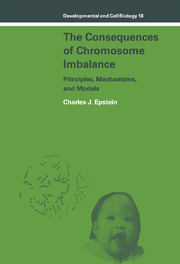Book contents
- Frontmatter
- Contents
- Preface
- Glossary
- PART I INTRODUCTION
- PART II CLINICAL OBSERVATIONS
- PART III THE THEORETICAL MECHANISMS AND ISSUES: THE PRIMARY AND SECONDARY EFFECTS OF ANEUPLOIDY
- 4 Gene dosage effects
- 5 Metabolic pathways, transport systems, and receptors
- 6 Regulatory systems
- 7 Assembly of macromolecules, cellular interactions, and pattern formation
- 8 Type and countertype
- 9 Nonspecific effects of aneuploidy
- PART IV EXPERIMENTAL SYSTEMS FOR THE STUDY OF MAMMALIAN AND HUMAN ANEUPLOIDY
- PART V THREE MAJOR CLINICAL PROBLEMS OF HUMAN ANEUPLOIDY
- PART VI CONCLUSION
- Appendix: Standard karyotypes of man and mouse and human cytogenetic nomenclature
- References
- Index
7 - Assembly of macromolecules, cellular interactions, and pattern formation
Published online by Cambridge University Press: 14 October 2009
- Frontmatter
- Contents
- Preface
- Glossary
- PART I INTRODUCTION
- PART II CLINICAL OBSERVATIONS
- PART III THE THEORETICAL MECHANISMS AND ISSUES: THE PRIMARY AND SECONDARY EFFECTS OF ANEUPLOIDY
- 4 Gene dosage effects
- 5 Metabolic pathways, transport systems, and receptors
- 6 Regulatory systems
- 7 Assembly of macromolecules, cellular interactions, and pattern formation
- 8 Type and countertype
- 9 Nonspecific effects of aneuploidy
- PART IV EXPERIMENTAL SYSTEMS FOR THE STUDY OF MAMMALIAN AND HUMAN ANEUPLOIDY
- PART V THREE MAJOR CLINICAL PROBLEMS OF HUMAN ANEUPLOIDY
- PART VI CONCLUSION
- Appendix: Standard karyotypes of man and mouse and human cytogenetic nomenclature
- References
- Index
Summary
Assembly of macromolecules
It is of interest that many of the dominantly inherited disorders for which biochemical abnormalities have been defined involve the synthesis of normal or decreased amounts of structurally abnormal protein molecules (C. J. Epstein, 1977). Included in this group are, for example, the dysfibrinogenemias (Graham et al., 1983), some of the hemoglobinopathies associated with unstable hemoglobins (Weatherall and Clegg, 1981), several of the connective tissue defects (osteogenesis imperfecta, Ehlers-Danlos syndrome) in which abnormal collagen chains are synthesized (Byers et al., 1983; Chu et al., 1983; Prockop et al., 1983; Stolle, Myers, and Pyeritz, 1983; Wenstrup, Hunter, and Byers, 1983; Prockop and Kivirikko, 1984), red cell disorders (elliptocytosis, spherocytosis) with abnormal membranes (Coetzer and Zail, 1981; Tomaselli, John, and Lux, 1981; Wolfe et al., 1982), and, in Drosophila, a meiotic mutant with an abnormal β-tubulin (Kemphues et al., 1980). In these disorders, it is easy to visualize how a structurally abnormal subunit interferes with the formation, stability, and/or function of a multisubunit macromolecular complex (C. J. Epstein, 1977). However, in the situation of aneuploidy, we are not dealing with qualitative alterations in subunit structure but only with quantitative changes in rates of synthesis and hence, in concentrations. Can such changes result in abnormality?
It is possible to generate hypothetical examples for how a change in the concentration of one subunit in a multisubunit protein could lead to the formation of abnormal or unusual products.
- Type
- Chapter
- Information
- The Consequences of Chromosome ImbalancePrinciples, Mechanisms, and Models, pp. 146 - 158Publisher: Cambridge University PressPrint publication year: 1986

